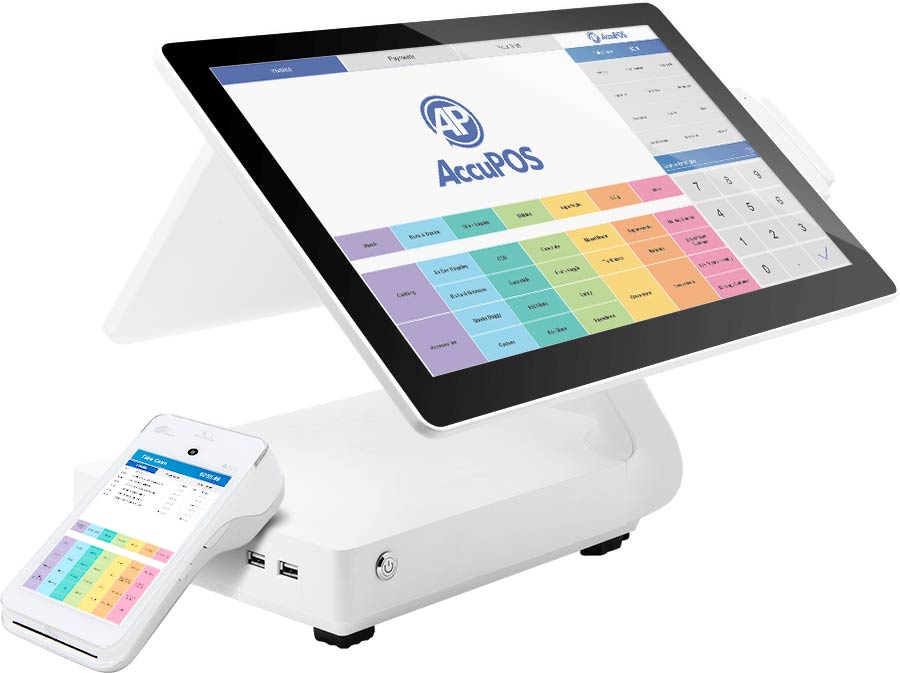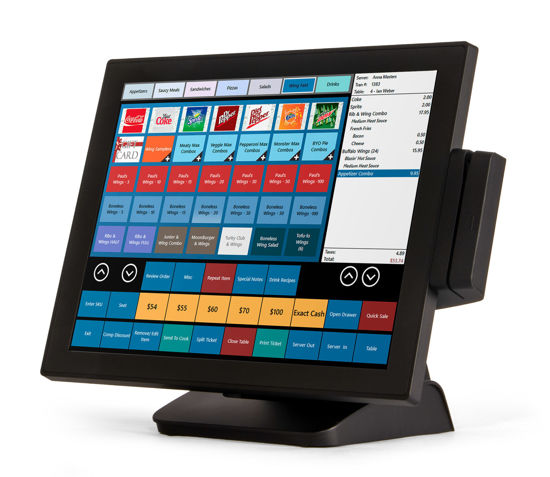Pos System For Small Business for Beginners
Pos System For Small Business for Beginners
Blog Article
7 Simple Techniques For Pos

Point of Sale Systems: Retail Point-Of-Sale Solutions Streamline Deals
What Does Pos Software Do?

Hardware Parts of a Point of Sale System What makes a POS system tick? It's not simply software application; the hardware plays a starring function. Consider it as the body to the software's brain. Without the ideal hardware, even the most advanced POS software application is simply a pretty face. Essential POS Hardware So, what are the must-haves? Let's break it down. The central processing unit, often a computer system or tablet, is the heart of the operation. The screen or touchscreen display allows personnel to interact with the system. A barcode scanner accelerate the checkout procedure. Remember the days of by hand going into each code? The reliable receipt printer provides consumers with a record of their purchase. A money drawer keeps your money safe and organized. A card reader allows customers to pay with credit or debit cards. Diving Deeper: Beyond the Essential However wait, there's more! Depending on your service, you might need customized hardware. A restaurant may integrate kitchen area printers to relay orders, while a retail store may use label printers for item tagging. Ever question how your regional bakery quickly prints those delicious-looking labels? Picking the Right Hardware: A Balancing Act Choosing the right hardware isn't practically buying the most costly equipment. It's about discovering the sweet area between functionality, durability, and budget plan. A little business just starting might choose a more basic setup, while a high-volume retailer will need robust, high-performance devices. Is it better to buy brand-new or used? Consider your options thoroughly. A new system offers the most recent technology and warranty protection, but a refurbished system can conserve you money. The Future of POS Hardware What does the future hold? Expect to see even more integration with mobile phones, biometric scanners for employee authentication, and advanced analytics control panels showed on larger, clearer screens. Picture a world where stock is immediately updated in real-time as items are scanned-- a world where you get more info can track your best-selling item from throughout the world. The possibilities are endless, and the hardware is continually progressing to satisfy the needs these days's services. Are you prepared to update your point of sale system?
Software Features and Capabilities: The Heart of Your POS System
Ever enjoy a seasoned barista move through a hectic morning rush? Their trick isn't simply caffeine; it's a smooth dance with their POS system. The software is the conductor of your service symphony, managing everything from sales to stock. But what notes should you be listening for? What abilities really matter in today's market?
Inventory Management: Beyond Counting Beans
Forget spreadsheets that haunt your dreams. Modern POS systems use real-time inventory tracking, notifying you when your stock of artisanal coffee beans dips precariously low. Believe of it as a digital guardian angel, avoiding those uncomfortable "Sorry, we're out!" minutes to clients. What if you could likewise anticipate need based on historical data? Numerous systems now use forecasting tools, a powerful weapon versus overstocking and lost sales. This helps avoid the predicament of lacking popular items or collecting excess inventory of slow-moving products, both of which can constrain cash circulation and area.
Sales Reporting and Analytics: Decoding the Information
Sales data is the new gold, and your POS system is the miner. Forget feeling in one's bones just how much you offered today. Dive deep into the information to discover patterns, recognize your best-selling items, and understand client habits. Which menu product pairs perfectly with the day-to-day special? Which promotion resonated most with your clients? These insights are not simply fascinating; they're actionable intelligence. Without trusted sales reporting, browsing the intricacies of company decision-making ends up being like sailing without a compass, increasing the possibility of errors and missed opportunities.
Client Relationship Management (CRM): Structure Bridges, Not Walls
Remembering a routine client's name and preferred order is captivating, however scaling that personal touch is challenging. POS systems with CRM abilities allow you to track customer purchase history, preferences, and even birthdays. Think of immediately using a discount on their birthday-- a little gesture that fosters loyalty and encourages repeat company. There is the prospective snag of poor data quality, which can lead to incorrect customer profiles and ineffective marketing efforts.
Payment Processing: Improving the Transaction
The checkout experience can make or break a sale. Seamless integration with various payment techniques-- credit cards, mobile wallets, even copyright-- is non-negotiable. Can your system deal with split payments? Does it use safe and secure tokenization to secure customer information? A clunky payment procedure is like hitting a sour note in your organization symphony, potentially disrupting the whole performance. Making sure compatibility with progressing payment innovations and adherence to security requirements are vital for keeping consumer trust and operational effectiveness.
Staff Member Management: Keeping the Team in Sync
From clocking in and out to managing permissions and tracking performance, staff member management features enhance operations and improve responsibility. Is scheduling a nightmare? Numerous POS systems use incorporated scheduling tools, enhancing staffing levels based on forecasted demand. A common obstacle that is often ignored is the challenge of integrating employee management performances with payroll systems, which can result in mistakes and inefficiencies in wage computations.
Advanced Characteristics: Leveling Up Your Operations
- Table Management: Perfect for restaurants, this function permits you to picture your dining room, track table status, and handle appointments.
- Loyalty Programs: Reward your finest clients and motivate repeat company with integrated loyalty programs.
- Online Buying Combination: Flawlessly integrate your POS system with online ordering platforms to broaden your reach.
Choosing the right POS system is about more than just performance; it's about discovering a partner that can grow with your business. Consider your current requirements, expect future growth, and do not hesitate to ask the difficult questions. The best software application can transform your organization from a disorderly cacophony into an unified masterpiece.
Industry-Specific POS System Applications
Think of the local pastry shop, dynamic with early morning consumers yearning fresh croissants. A generic POS system might manage deals, but can it handle complex dishes, track component inventory, or immediately adjust production schedules based upon sales data? Most likely not. That is where the charm of industry-specific POS systems shines.
Dining establishments and Hospitality
For bustling dining establishments, speed and accuracy are vital. The number of times have you seen servers managing orders, modifications, and splitting expenses, all while trying to provide excellent service? A restaurant POS system streamlines these processes, permitting table management, kitchen area order tickets, and even online purchasing integration. These systems frequently include functions like ingredient-level stock tracking, crucial for managing food costs and minimizing waste. Ever question why your preferred meal is in some cases not available? It may come from a lack of correct inventory management.
- Table Management
- Cooking Area Order Tickets
- Online Purchasing Integration
- Ingredient-Level Stock Tracking
Retail Solutions
Retail, with its varied inventory and customer interactions, requires a different set of tools. Envision a shop clothes store having a hard time to keep an eye on sizes, colors, and seasonal collections utilizing a basic checkout system. An industry-specific retail POS system offers features like barcode scanning, consumer loyalty programs, and in-depth sales reporting. These systems can even incorporate with e-commerce platforms, supplying a seamless omnichannel experience for customers. Did you understand some retail POS systems can predict future sales patterns based on historical data? Now that is effective!
The Hazards of a Mismatch
Choosing the wrong POS system can create substantial functional difficulties. A clothes shop using a dining establishment POS, for instance, would find it unsuitable for handling inventory with sizes and colors. The absence of correct reporting and analytics might lead to misinformed buying decisions and lost income. The outcome could be comparable to trying to fit a square peg in a round hole.
Secret Factors to consider
Selecting an industry-specific POS system requires careful examination. Think of your business's distinct requirements and functional workflows. Does the system integrate with existing software? Does it use the needed reporting capabilities? Is it scalable to accommodate future development? A well-chosen POS system is not just a deal tool; it's a tactical property that can drive effectiveness, enhance consumer fulfillment, and eventually, improve your bottom line. Remember, it is a financial investment in your company's future, not simply a cost.
Security Considerations for Point of Sale Systems
Ever heard the tale of the mom-and-pop shop that lost everything due to the fact that of a single, ignored security flaw in their POS system!.?. !? It's a cautionary tale, and it highlights a critical element frequently overshadowed by the appeal of expensive functions and streamlined operations. The reality is, a POS system is just as great as its security. What great is a system that crunches numbers in a flash if it permits criminals to swipe client's data just as quickly?
The Vulnerability Minefield
The digital landscape is a battlefield. Every POS system, despite size or elegance, is a prospective target. Are you truly got ready for the risks prowling around the corner? The real pinch comes when you find that your outdated software application has a gaping hole that hackers can make use of, turning your business into an unwitting accomplice in identity theft. The difficulty is that hackers are crafty and are constantly changing their techniques.
Common Security Spaces and Expert Tips
- Weak Passwords: "Password123" isn't cutting it. Use strong, special passwords for all POS system accounts and alter them regularly. Two-factor authentication is a must.
- Unsecured Networks: Your Wi-Fi is like leaving the front door open. Secure your network with strong file encryption (WPA3 if possible) and consider a different network for your POS system.
- Outdated Software: Software application vendors spot security holes all the time. Stopping working to update is like inviting problem. Establish automatic updates or schedule routine maintenance.
- Employee Training: Your personnel is your first line of defense. Train them to acknowledge phishing efforts, secure passwords, and report suspicious activity.
Information File Encryption: Your Guard Versus the Dark Arts
Think about data file encryption as a secret code. It scrambles delicate details, like credit card numbers, making it unreadable to unapproved users. Without file encryption, your clients' monetary details resemble sitting ducks, ripe for the picking by cybercriminals. It's not practically safeguarding your clients; it has to do with safeguarding your credibility and avoiding significant fines.
PCI Compliance: The Rulebook You Can't Overlook
If you accept charge card, you're bound by the Payment Card Industry Data Security Requirement (PCI DSS) It's a set of security standards designed to secure cardholder information. Stopping working to comply can lead to fines, penalties, and even the loss of your capability to process credit card payments. It's a headache, yes, however it's a necessary one. Believe of PCI compliance as the expense of doing service in the digital age.
Consider this: every deal processed through your point of sale is a prospective entry point for harmful actors. By implementing robust security steps, you're not just safeguarding your business; you're protecting your customers' trust and guaranteeing the long-lasting practicality of your operations. The security of your POS system isn't simply a technical issue; it's a company imperative. It requires constant vigilance, proactive procedures, and a commitment to remaining ahead of the curve.